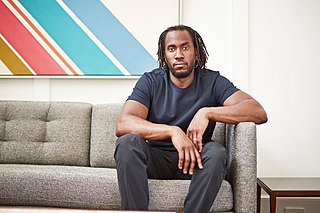A Quote by Junot Diaz
I'm of African descent and my sister looks completely black, but I didn't look black. I was the super-nerdy kid who was also willing to fight.
Related Quotes
The cliche of the nerdy kid who doesn't go outside and just plays games is completely untrue. And it's also true for the nerdy kid who studies comic books and turns into this genius, and it is also true for the nerdy kid who listens to every nerdy thing that Led Zeppelin put out. That kind of obsession in a 16-year-old is not ugly. It's beautiful.
One of the things that made the Black Muslim movement grow was its emphasis upon things African. This was the secret to the growth of the Black Muslim movement. African blood, African origin, African culture, African ties. And you'd be surprised - we discovered that deep within the subconscious of the black man in this country, he is still more African than he is American.
My mom is Jamaican and Chinese, and my dad is Polish and African American, so I'm pretty mixed. My nickname in high school was United Nations. I was fine with it, even though I identify as a black woman. People don't realize it hurts my feelings when someone looks at my hair or my eyes, and says, "But you're not actually black. You're black, but you're not black black, because your eyes are green." I'm like, "What? No, no, I'm definitely black." Even some of my closest friends have said that. It's been a bit touchy for me.
The potential significance of Black feminist thought goes far beyond demonstrating that African-American women can be theorists. Like Black feminist practice, which it reflects and which it seeks to foster, Black feminist thought can create a collective identity among African-American women about the dimensions of a Black women's standpoint. Through the process of rearticulating, Black feminist thought can offer African-American women a different view of ourselves and our worlds
People don't realize it hurts my feelings when someone looks at my hair or my eyes, and says, 'But you're not actually black. You're black, but you're not black black, because your eyes are green.' I'm like, 'What? No, no, I'm definitely black.' Even some of my closest friends have said that. It's been a bit touchy for me.
Patriotism is best exemplified through auto-critique. When you're willing to stand up within the group and say, 'It is wrong for Black people to be anti-Semitic,' or 'It is wrong for America to discriminate against persons of African descent and made them slaves and based its wealth upon free labor,' it's crucial to say that.
There are more than 100 million African women who go topless at some point in the day, each and every day, to honor both God and our ancestors. So being in a country like America where nothing is hated more than the image of the black woman, even by black people'because her womb produces the black man and makes us black'I find it of grave importance to implement African images, and especially to produce media images that acknowledge the sexual power and fertility of black women.





































